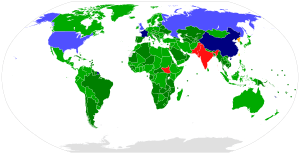Nuclear Non-Proliferation Treaty facts for kids
The Nuclear Non-Proliferation Treaty (often called NPT) is an important international agreement. Its main goal is to stop the spread of nuclear weapons. It also aims to encourage countries to get rid of their nuclear weapons over time. Plus, it wants to make sure countries can use nuclear energy for peaceful things, like making electricity.
This treaty was created in 1968 and officially started in 1970. Since then, 190 countries have agreed to follow its rules. However, a few countries have not signed it: India, Israel, Pakistan, and South Sudan. North Korea signed the treaty but later decided to leave it in 2003.
Contents
What the Treaty Says
The NPT has a few key ideas to help keep the world safer from nuclear weapons.
Who Can Have Nuclear Weapons?
The treaty states that only five countries are allowed to have nuclear weapons. These are known as "nuclear weapons states." They are:
- China
- France
- The United Kingdom
- The United States
- Russia
All five of these countries have signed the NPT. They have promised not to help any other nation build nuclear weapons.
What Other Countries Promise
All other countries that sign the NPT promise not to build or get nuclear weapons for themselves. They also promise not to help other nations build them. This helps prevent more countries from getting these powerful weapons.
Peaceful Nuclear Energy
The treaty also says that every country has the right to use nuclear power for peaceful purposes. This means they can build nuclear power plants to create electricity. However, countries that are not "nuclear weapons states" promise not to use their nuclear technology to make nuclear weapons. This is a key part of the treaty.
Who Helps Make it Work?
The main groups that helped create and manage this treaty are the United Nations and the IAEA. The IAEA helps make sure countries are following the rules about using nuclear energy only for peaceful reasons.
Images for kids
See also
 In Spanish: Tratado de No Proliferación Nuclear para niños
In Spanish: Tratado de No Proliferación Nuclear para niños
 | Percy Lavon Julian |
 | Katherine Johnson |
 | George Washington Carver |
 | Annie Easley |



